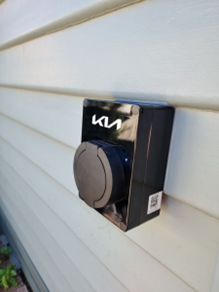Car chargers. They vary in price, size, style, charging rates and are constantly being upgraded to be faster and more efficient.

Over the past few years, the way we travel has begun to change as we move closer to a more eco friendly lifestyle. Use of alternative energy sources and the introduction of electric vehicles is one such change that is gaining momentum including here in Australia. In 2021, around 6.6 million electric cars were sold worldwide and while uptake has been slow to start here in Australia, electric vehicles accounted for 2% of our overall market in 2021. Driven by advancing technology and costly petrol prices, electric vehicles are becoming more desirable, affordable and readily available but what exactly is involved in owning an electric vehicle and is it worth it for you?
An electric vehicle is really no different to your child’s motorised race car. It contains a rack of rechargeable lithium-ion batteries that, when charged, push power through a motor causing the wheels to turn and shift the car forward. They don’t require massive water tanks or heating systems and don’t emit harsh chemicals and fumes. To add the positives, they are nearly silent which hands down beats the race car crashing through your hallway. However, they do require charging from an external power source and that is where things can get complicated.
Car chargers. They vary in price, size, style, charging rates and are constantly being upgraded to be faster and more efficient. Which one is right for you will depend on what car you choose and how far you plan to travel. The bigger the battery, the further you can go before needing to recharge. However, bigger batteries need longer charging times to reach full capacity and also relate to bigger cars which are heavier and require more power to start moving. Smaller batteries are lighter and more efficient when in heavy traffic but provide a shorter travel range which can mean more planning before heading out on long road trips.
Car chargers also use two different types of electricity and come with different charging rates. Electric vehicles with the correct charger can be charged by either Alternating Current (AC) or Direct Current (DC) electricity. AC electricity is what you get straight off the grid via your household powerpoint. Level 1 and 2 chargers use this type. DC electricity carries a much higher voltage and is found more commonly on the public charging networks set up by Tesla and Chargefox for example. These charging stations use level 3 chargers and can charge your EV significantly faster but a converter is required for this type of power to be stored in the batteries.

Level 2 charging is 3x faster than level 1 and charges through an at home box charger or a public AC charging station. This level is far more suited for medium to large EVs and/or if you travel greater distances. Installation of a home box charger does require a qualified electrician which is one of the ways that we can help.
Level 3, or “DC Fast Charging” as it is more commonly known, uses much higher voltage and hence can charge vehicles rapidly. This can be as short as 20 mins depending on your car. While chargers are advancing quickly, at this stage DC fast charging is highly expensive and more commonly found at public charging stations rather than at home.
So how can Smillie Electrical Services help you on your EV journey? With a wealth of knowledge coming from over 20 years electrical experience, we can help you select the right charging equipment required to charge your EV. We are also fully qualified to supply and install chargers for Telsa, Hyundai, Kia, BMW and many more all at your home or office at a time suitable for you. Included in our price is a lifetime warranty on all our work and professional service that will allow you to enjoy a smooth and exciting transition to your electric vehicle. Please contact us today for a free quote!





Areas We Service
Smillie provides 100 point safety checks across south east Melbourne, including: Ashburton, Beaconsfield, Berwick, Burwood, Camberwell, Ferntree Gully, Glen Waverley, Hawthorn, Kew, Lysterfield, Malvern East, Narre Warren, Rowville, Oakleigh, St Kilda, Caulfield, Malvern, Blackburn and Upper Beaconsfield.

